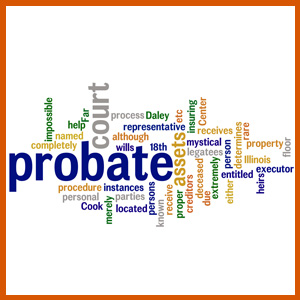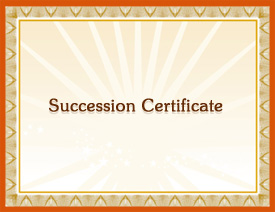 Probate of Will Probate of Will
Probate is a legal process in which the court certifies the authenticity of the will. It establishes the legal character of the Executor to implement the Will and to the validity of the Will. Probate can be granted only to the executor appointed by the will. The appointment may be expressed or implied. A Probate is necessary when
- Will or Codicil is that of Europeans, East Indians, Armenians, Jews, Indian Christians and Parsis.
- Case of Wills or Codicils of Hindus, Buddhists, Sikhs or Jains in Chennai, Kolkata and Mumbai or where they relate to immovable propertyin these places.
- Where a debt due to the estate of a Hindu is to be recovered.
- A Probate can be granted only after seven clear days from the date of death of the person who has made the Will.
- The cost of getting a probate includes legal fees as well as stamp duty on the value of the property being willed. The stamp duty varies from state to state.
How to obtain a probate of a will ?
A probate is a copy of a will certified by a court of competent jurisdiction. It proves that it is the last and final will of the deceased penned on a particular date. A probate is granted with the court seal and has a copy of the will attached to it. An administrator or executor appointed under the will may not be able to administer its provisions without a probate. It may also be necessary when the deceased leaves behind securities with various nominees and there is a dispute on their division. The nominee can only hold the assets in trust till these are divided as indicated in the will after aprobate has been obtained. In the absence of a will or nomination, succession laws come into play.
Application
The application for a probate has to be made to the competent court (a pecuniary jurisdiction may require a higher court to issue a probate for high-value immovable assets) through a lawyer.
Documents
The court usually asks the petitioner to establish the proof of death of testator, proof that the will has been validly executed by the testator, and that it is the last will and testament of the deceased.
 Notification Notification
After receiving the petition or application for probate, the court issues a notice to the next of kin of the deceased to file objections, if any, to the granting of probate. It also directs the publication of a citation in a newspaper to notify the general public.
Fees
The court may impose a percentage of assets as a fee to issue a probate. In Maharashtra, for example, a court fee of Rs 25 is payable for assets less than Rs 50,000; 4% for assets between Rs 50,000-2 lakh, and 7.5% for assets over Rs 2 lakh. There is a ceiling of RS 75,000.
Points to note
- Under the Indian Succession Act, a probate can be granted only to the executor appointed under a will.
- If the executor is not available to administer the estate, an application must be made for appointing the same by the court before applying for probate.
- A probate is a must when the will is for immovable assets in Mumbai, Kolkata or Chennai.
Probate of a Will when granted, establishes the genuineness of Will from the death of the testator and renders valid all intermediate acts of the Executor as such.
What will be the legal consequences if the Will is not Probated ?
If the Will which is required to be probated, under the Act, if not probated, has no legal sanctity and binding force.
A probate differs from succession certificate. A probate is issued by the court, when a person dies testate i.e.having made a will and the executor or beneficiary applies to the court for grant of probate. In case a person has not made a will his legal heirs will have to apply to the court for grant of a succession certificate which will be given as per applicable laws of inheritance.
Letter of Administration
If there is no will or a Will does not name any executor then one needs to get be Letter of Administration
Letter of Administration is issued by a competent authority (court) and appoints the Administrator to dispose of the property of a person. It is required when :
- Testator has failed to appoint an executor under a Will OR
- Where the executor appointed under a Will refuses to act OR
- Where executor has died before or after proving the Will but before administration of the estate.
A Letter of Administration can be granted after 14 clear days from the date of death of an intestate.
For obtaining a letter of administration the beneficiary has to apply to the court. The court on receiving satisfactory proof of valid execution of the will issues letter of administration to the beneficiary. The application for letter of administration has to contain the following details :
The time of the testator’s death
- That the writing annexed in his last will and testament
- That it was duly executed
- The amount of assets which are likely to come to the petitioner’s hands, and
- The petitioner is the executor named in the will
 A Letter of Administration may be granted to one or several people who may apply to the Court. If no one applies, it may be granted to a creditor of the deceased. A Letter of Administration cannot be granted to a minor or a person of unsound mind. A Letter of Administration may be granted to one or several people who may apply to the Court. If no one applies, it may be granted to a creditor of the deceased. A Letter of Administration cannot be granted to a minor or a person of unsound mind.
Succession Certificate
In the absence of a will, if there is no survivor amongst the account holders and a no nomination had been done by the holder(s) earlier, a Succession Certificate is be the primary document through which the heirs can stake a claim to the assets of a deceased relative. A succession certificate, under the Indian Succession Act, is a document that gives authority to the person who obtains it, to represent the deceased for the purpose of collecting debts and securities due to him or payable in his name.
- It establishes the authenticity of the heirs and give them the authority to inherit debts, securities and other assets that the deceased may have left behind.
- Where the Application has to be made ? The beneficiary has to approach the district or the high court within whose jurisdiction, i.e legal territory, the assets fall(where the properties of your deceased relative are situated ) and file a petition for a succession certificate. Both these courts have concurrent jurisdiction, i.e they are both at par. Depending on the value of the estate of the deceased, the matter shall go to the type of court, which can conduct cases for that value [This is known as "pecuniary jurisdiction" of the court]
- The petition should mention the relation of the petitioner with the deceased, details of other surviving legal heirs and beneficiaries, the time, date and place of death and also if he died intestate. You will also have to attach the death certificate and other documents that the court may require.
- The court, after examining the petition, issues a notice to all those concerned. It also issues a notice in a newspaperand specifies a time frame (usually one-and-a-half months) within which anyone who has objections may raise them. If no one contests the notice and the court is satisfied, it passes an order to issue a succession certificate to the petitioner. If there is more than one petitioner, then the court may jointly grant them a certificate but it will not grant more than one certificate for a single asset. For this you have to then submit Judicial Stamp papers of sufficient amount (as per the prescribed court fees structure) in the court, whereafter the Certificate is typed by the court staff, duly signed and sealed and delivered.
- Apart from lawyer’s fees, courts levy a fixed percentage of the value of the estate as a fee which may be upto 3% of the value of assets.
- How long should it take to obtain the Succession certificate from the court ? If the petition is not contested then the court should roughly take about 3-4 months (sometimes even 5-7) from date of filing to receive your certificate.
- Once you have the certificate, you are authenticated to distribute the assets to the legal heirs as per the succession laws. Most people think that if the succession certificate is obtained then the person is the rightful owner of the
 deceased person’s properties, which is not true. A succession certificate allows the person to act exactly similar to how a nominee would act. It gives the authority to the holder for distributing the deceased person’s assets. deceased person’s properties, which is not true. A succession certificate allows the person to act exactly similar to how a nominee would act. It gives the authority to the holder for distributing the deceased person’s assets.
- A Succession Certificate is not granted in cases where obtaining a Probate of Letter of Administration is necessary such as when there is a valid will.
Proof Of Death
Proof of death is usually shown by submission of original Death Certificate.
- If a person was killed in an action while serving in armed forces, the official notification may be produced in proof of death of the testator.
- Where there is an air crash or sunk ship on the high seas and there is no possibility of survival and a persons body is not recovered the court may take notice of the occurrence and be satisfied regarding the fact of death.
- Where a person disappears or is missing, such a person as per law is presumed to have died if he is not heard of for a period of seven years.
Some technical terms related to Will
Testate: When a person dies leaving a will, they are said to have died testate.
Intestate succession:When a person dies without leaving a will , they are said to have died intestate.
Testator is a person who makes a Will.
Legatee/Beneficiary is a person who inherits the property under a Will.
Codicil is an instrument made in relation to a Will, explaining, altering or adding to its dispositions and is deemed to be a part of the Will.
Executor An executor is a person who is appointed by a testator to execute his Will. In other words, an executor is duty bound to distribute the assets of the testator as per the provisions of his Will. He is the legal representative of the deceased person (testator) |